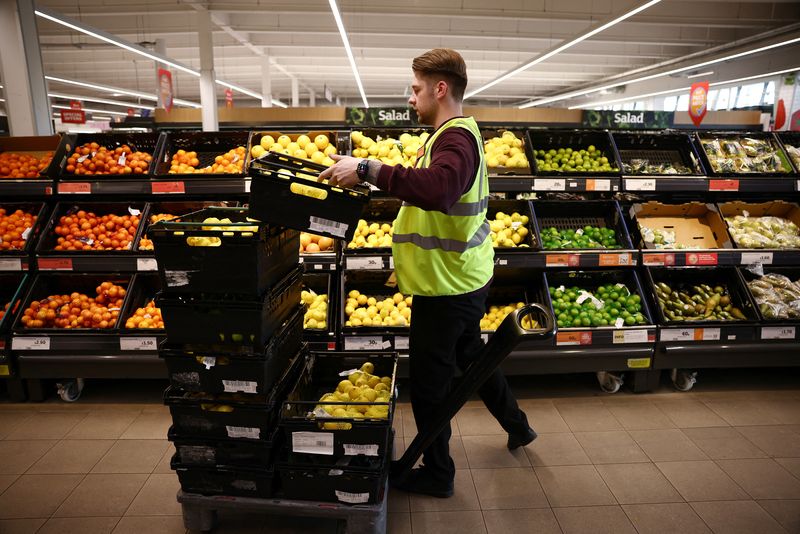By William Schomberg and Andy Bruce
LONDON (Reuters) -Britain's high inflation rate unexpectedly slowed, raising the prospect of the Bank of England pausing its long run of interest rates hikes as soon as Thursday.
The pound fell and investors saw a nearly 50-50 chance of rates staying on hold at the BoE's September meeting after the consumer price index sank to an 18-month low of 6.7% in August.
That was only a small fall from July's 6.8% but flew in the face of forecasts by economists polled by Reuters - and the BoE too - for an increase.
Underlying measures of inflation weakened more sharply, opening up the possibility that BoE Governor Andrew Bailey and his Monetary Policy Committee (MPC) colleagues will keep rates on hold on Thursday after 14 back-to-back increases since December 2021.
"The big downside surprise to core inflation throws the Bank of England a major curveball," Chris Hare, an economist with HSBC (LON:HSBA), said.
Strong wage growth in recent data meant a rate hike was still the most likely outcome on Thursday but "today's data raises a risk that the MPC will remain on hold," he said.
Sterling sank by half a cent to its lowest against the U.S. dollar since May and it also fell against the euro
The slowdown in inflation was driven by a drop in often-volatile hotel prices and air fares, and by food prices rising less than a year ago, the Office for National Statistics said.
That offset a jump in global fuel prices and an increase in a tax on alcoholic drinks.
Britain's inflation rate has fallen from a peak above 11% last October but even after the latest drop it remained among the highest in Western Europe, topped only by Austria and Iceland in August.
But core inflation - which strips out volatile food and energy prices - fell sharply to 6.2% from 6.9% in July.
Service sector inflation - also closely watched by the BoE - lost some of its steam too, slowing to 6.8% from 7.4%.
INFLATION PRESSURES AHEAD
"Thursday's Bank of England meeting just got a lot more interesting," James Smith, an economist at ING, said. "It's a very close call, but we're still tempted to say the Bank will follow through with a hike tomorrow."
He said the expected increase was likely to be the BoE's last for now.
Yael Selfin, chief economist at KPMG UK, said a recent rise in global oil prices and potential pressures on food prices would weigh on the BoE.
"These could not only slow the disinflation process further but also reverse the decline in inflation expectations, causing further worry for the Bank of England," she said.
Last week, the European Central Bank raised rates to a record high but signalled that it was likely to pause. The U.S Federal Reserve is expected to keep rates on hold on Wednesday.
There was further encouraging news for the BoE as separate data showed pay deals lost more of their inflationary heat.
The latest figures were also a relief for the government of Prime Minister Rishi Sunak who has promised to halve inflation this year before an election expected in 2024.
"Today's news shows the plan to deal with inflation is working - plain and simple," finance minister Jeremy Hunt said.
"But it is still too high which is why it is all the more important to stick to our plan to halve it so we can ease the pressure on families and businesses."

He said Britain could not afford to go on a "borrowing binge," in a swipe at the opposition Labour Party which is riding high in opinion polls.
There were signs of a further weakening of inflation pressure ahead as factory gate prices fell 0.4% in the 12 months to August. Manufacturers' input prices dropped by 2.3%.